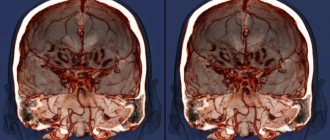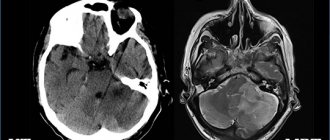What causes ZPR - reasons
In approximately 75% of cases, the exact cause of the disease is unknown. We can only assume that the problem is due to defects in genes (or chromosomes), injuries or conditions that develop in the fetus in the womb, diseases of early life and environmental influences.
The role of genetics
If one or both parents have an intellectual disability, there is a much greater chance that their children will also have the condition. There are many genetic (inherited) causes of mental retardation, which occur due to deficiencies or omissions in the genetic material passed from parent to child. Sometimes mental retardation is caused by abnormalities in chromosomes rather than individual genes. Down syndrome, one of the most common causes of mental retardation, is caused by an extra chromosome in cells. Another fairly common chromosomal defect, called fragile X syndrome, causes PD mainly in boys.
* Genes are chemicals in the body that help determine a person's characteristics, such as hair or eye color, and are inherited from his parents. They are located on chromosomes found in the cells of the body. * Chromosomes (KRO-mo-somes) are thread-like structures inside the nucleus of cells on which genes are located.
Problems during pregnancy
Infections in pregnant women, such as rubella or toxoplasmosis, also cause mental retardation in children. Despite the fact that the mother may not suffer from the infection, the developing fetus becomes infected through the maternal body and has damage to certain areas of the central nervous system and other organs and systems. Pregnant women who drink alcoholic beverages are at risk of having a mentally retarded child through a condition known as fetal alcohol syndrome (FAS). This is a common and preventable cause of PVD. Some drugs (such as cocaine or amphetamines), when taken during pregnancy, can harm the baby's mental development. Maternal malnutrition and radiation exposure during pregnancy can also cause similar developmental disorders.
Birth injuries
Oxygen starvation in the fetus during childbirth is also a cause of mental retardation. Babies born prematurely are usually mentally retarded, especially if the baby weighs less than 1.5 kg.
Disorders that occur after birth
PPD can be caused by problems such as lead or mercury poisoning, severe malnutrition, accidents that cause severe head injuries, interruption of oxygen supply to the brain (such as near drowning), or diseases such as encephalitis, meningitis and untreated hypothyroidism in infants.
It is important to understand: before starting treatment and correction of the child’s condition, it is necessary to determine the roots of the problem.
Causes of mental retardation
Oligophrenia is congenital, manifesting itself at the earliest stage of human development.
It's quite common. It is believed that the pathology occurs in 1% of the population. Of the total number of patients, mild degree is determined in 85%, moderate in 14%, and severe in 1%. Experts suggest that in fact the disease is even more widespread, since not all patients undergo a psychiatric examination. Boys get sick more often than girls. The main age for detecting pathology is 6-7 years. Mild forms are detected by the age of 17-18 years. Obvious deviations make themselves felt in the first years of life and require emergency treatment. The main causes of dementia:
- Intrauterine damage to a developing child due to traumatic brain injury during childbirth, asphyxia.
- Chromosomal abnormalities: Down syndrome, Williams syndrome. Angelman, fermentopathy and other pathologies.
- Infectious diseases of the mother leading to disruption of normal brain development. We are talking about neurosyphilis, herpes, cytomegalovirus, rubella, toxoplasmosis,
- Prematurity.
- Parental substance abuse.
- Intrauterine diseases: hydrocephalus, meningoencephalitis.
Main types of ZPR
Mental retardation is classified into four main types.
ZPR of a constitutional nature
Reasons: genetics. Symptoms: playful mood regardless of age, unstable attachment, disturbance of the emotional-volitional sphere, frequent mood swings.
ZPR of a somatogenic nature
Causes: severe illnesses with complications of brain function. Pathology can be triggered by previous surgical interventions, diseases of the cardiovascular system, dystrophies of various origins and severity, and allergic manifestations. Symptoms: causeless whims, increased nervousness, excessive complexes.
Mental retardation disorder of a psychogenic nature
Reasons: lack of parental attention and love, errors in upbringing, unfavorable living conditions. Symptoms: psychosis, attacks of nervousness, intellectual impairment, which ultimately leads to general psychological immaturity.
ZPR of cerebral-organic nature
Causes: intrauterine disorders that can occur due to a woman taking alcohol, toxic and narcotic substances during pregnancy. Sometimes the cause of the development of this particular type of pathology can be birth injuries and oxygen starvation of the brain during childbirth. Symptoms: instability of mental state.
What is mental retardation
Mental retardation or mental retardation is a violation of the normal speed of mental development, that is, its slowdown, when there is a lag in the formation and maturation of thinking, emotional skills, the ability to remember, concentrate, respond to questions and requests in accordance with age limits.
In short, mental retardation affects the following mental functions:
- attention;
- emotional-volitional sphere;
- thinking;
- memory.
This illness is not incurable and is not as terrible as mental retardation, as proven, for example, by Komarovsky. Doctors diagnose mental retardation and mental retardation if the child’s development level is insufficient for his age norm, but over time the situation may change, so intelligence tests should be taken regularly.
If after preschool age the indicators do not improve, then there is a high probability of changing the diagnosis to mental retardation. To avoid this, it is necessary to promptly detect dysontogenesis or a disorder of mental development in a child and begin a course of treatment.
Symptoms of mental retardation in children at different age intervals
Sometimes signs of the disorder can be observed in children immediately after birth, and in some cases, problems begin to appear at school age and later. It is important to learn to recognize your baby’s characteristics in time.
Let's look at the main anxiety symptoms for different age categories of children:
- Mental developmental development up to one year: late starts to hold up head, crawl, walk, talk, use cutlery.
- Signs of mental retardation per year - a quiet, unemotional child, with a limited or absent set of simple words, does not show a reaction to being addressed.
- ZPR 2 years old - no desire to learn something new by repeating after others, a primitive set of words (up to 20), no ability to compose logical phrases and sentences, limited memory skills.
- Symptoms of mental retardation in children 3 years old - rapid unconscious speech with swallowing sounds, syllables or word endings, when answering a question, may think for a long time and repeat the question itself, slow movements or hyperactivity, no desire to explore the world around them, aggressiveness, increased salivation, narrow spectrum emotions, signs of cerebral palsy may appear.
- Mental retardation 4 years - tearfulness, aggressiveness, emotional instability, causeless laughter or hysteria, underdeveloped speech, ignoring requests from adults, difficulty in contacting others.
- Mental retardation in a 5-year-old preschooler - ignoring peers, aggressiveness or complete passivity, sudden mood swings, speech difficulties, especially in constructing even a simple dialogue, difficulties with memory, lack of simple everyday skills.
- Mental retardation 6 years old - behavioral disorders, difficulty concentrating, performing basic everyday skills, noticeable lag behind peers in speech, emotional and intellectual development.
- Symptoms of mental retardation in children aged 7 years - difficulties with reading, problems with logical problems and mathematical calculations, lack of emotional contact with peers, poor vocabulary, difficulties in voicing their thoughts and requests, behavioral problems (aggression, tearfulness, whining, self-isolation , unreasonable laughter, etc.).
- Features of mental retardation in adolescents - mental instability, undeveloped self-esteem, no resistance to criticism, trying to avoid the team, psychomotor disinhibition and excitability, suppressed cognitive activity, limited memory (usually short-term), impaired verbal-figurative, visual-figurative and visual-effective thinking , speech disorders, lack of motivation, development of infantilism. A characteristic symptom of psychophysical infantilism is hysteroid psychopathy and depressive states.
At an early age, it is problematic to diagnose mental retardation. The most pronounced symptoms can be observed in preschool age, when self-care skills, spatial orientation, communication skills, fully developed memory and formed speech should already be formed. Regardless of the age at which mental retardation was diagnosed, correction of this condition must be started immediately.
Causes
Factors that provoke the appearance of PPD include:
- genetic predisposition (a combination of retardation in the development of the body and psyche); - permanent illness, disability, long courses of treatment; - traumatic emotional experiences; - brain dysfunctions.
Symptoms of mental retardation are best diagnosed in children 3 years of age and older ; at an earlier age, recognition of the disease is difficult, since its clinical manifestations are subjective and related to the acquisition of knowledge.
At school age, the presence of the disease can be assumed based on educational results and diagnostic tests. The psychological and pedagogical characteristics of children with developmental delays can indicate the degree of development of the disease, and a speech pathologist or child psychologist should identify the causes. Only then can a treatment program for this deviation be developed and positive results in the education of such children be achieved.
Screening and tests
Diagnosis of mental retardation can only be performed by a certified psychologist capable of administering, scoring, and interpreting an intelligence or cognition test. Screening for the disease includes tests to analyze the child's intellectual and adaptive development, including the Denver Abnormal Development Test and IQ testing (these tests are performed on children and adolescents under 18 years of age.)
Children with an IQ of less than 70 and with limitations in two or more areas of adaptive behavior (eg, motor skills, communication abilities, self-help and independent living skills, and other daily living skills) generally may be considered intellectually disabled.
Classification of mental retardation
Under the influence of external factors, metabolic processes in the brain structure can be disrupted, which leads to the development of mental retardation or mental retardation.
Mental retardation is classified into three degrees of severity:
- debility - with a given degree of mental impairment, the child is able to achieve independence in care and acquire housework skills. The main difficulties will begin at school: children with this diagnosis cannot study successfully according to the school curriculum, but they are able to learn to count, read, and write. They can master a simple profession and perform simple tasks;
- imbecility - moderate mental retardation or mental retardation. Self-care skills are quite difficult for such children. They learn basic movements poorly and cannot always understand speech. Such a child needs special pedagogical training and attention during adolescence and childhood. Mature people suffering from imbecility need serious supervision;
- idiocy is a deep stage of mental retardation, which consists in the fact that human development stops at the age of three years. Such children are not capable of following and understanding rules, requirements, and instructions. They are characterized by gross deviations in the motor sphere. Fecal and urinary incontinence often occurs. Serious neurological abnormalities may occur. As a rule, the causes of idiocy are organic (hereditary, genetic), but sometimes this condition appears after receiving a severe brain injury.
Causes of delayed emotional development
Disturbances in the development of psycho-speech and speech spheres are not an independent phenomenon, but the result of deviations in the development of the central nervous system and brain.
The main reasons for delayed emotional development include:
- illnesses suffered by the mother during pregnancy. A factor that contributes to the deviation of fetal development may be poisoning, infection, various injuries;
- hypoxia (oxygen starvation) of the fetus in the womb;
- birth trauma (trauma of the cervical vertebrae, central nervous system, perinatal encephalopathy);
- difficult labor (premature, rapid labor, entanglement with the umbilical cord);
- the baby has suffered complex infections that have caused brain disease and injury;
- chromosomal, genetic pathologies that can lead to disruption of brain structure;
- serious mental trauma;
- improper upbringing: children are abused, brought up in excessive care, or, on the contrary, abandoned to self-development. Most often, children with delayed psycho-emotional development come from dysfunctional families.
Diseases that can cause deviations in the development of a child include:
- metabolic disorders of the central nervous system and congenital anomalies;
- epilepsy and other mental pathological conditions;
- hydrocephalus;
- cerebral ischemia;
- high blood pressure;
- cerebral palsy;
- violation of liquor dynamics;
- pathologies of cerebral vessels;
- a brain tumor;
- leukodystrophy.
Retardation of mental and speech development is formed under the influence of infections, birth injuries, hereditary diseases, and an unfavorable psychological climate, which lead to disturbances in brain function. Therefore, it is necessary to treat not only mental disorders, but also the causes of their occurrence. Osteopathic therapeutic methods show good results in the treatment of mental and psychological retardation.
Complications and consequences
Late diagnosis of children with mental retardation and correction of this complex mental state can forever leave an imprint on the child’s life. Adolescence for a full-fledged child goes through difficulties, and for a child with mental retardation, inferiority complexes may additionally develop, which provoke a number of difficulties in communicating with the opposite sex and with peers. Low self-esteem leaves a negative imprint on academic performance and aspiration, and as a result, increased conflict appears in the team and family. Neglected situations can lead to irreversible consequences - severe depression and suicide. ZPR can provoke the development of chronic and incurable defects: various mental disorders, impairment of written, speech, and everyday skills. In adulthood, there may be problems with adaptation, working in a team, and starting a family.
Rules for raising a child with mental retardation
After hearing a diagnosis, every parent, first of all, must emotionally gather themselves and prepare for the difficult struggle for a full-fledged future for the child. Indeed, in medical practice there are quite a lot of examples when children, after being diagnosed with mental retardation, studied in regular schools and demonstrated, if not high, but average educational success. The second thing you need to understand is that something doesn’t work out for a child not because of laziness, it’s just that everything comes a little more difficult and slower to him. There is no need to independently develop a sense of inferiority in your baby with constant reproaches and abuse. The main task of parents is to support, motivate, help, demonstrate understanding and love.
Is it possible to prevent PPD?
There is no specific way to prevent mental retardation. Improved health care, prenatal testing, and public health education can help prevent some cases of BD. People who want to become parents can receive genetic counseling to determine the likelihood of mental retardation from an inherited disorder. Medical tests such as amniocentesis, human chorionic villus sampling and ultrasonography can help identify inherited metabolic and chromosomal disorders associated with mental retardation. Vaccinations can protect pregnant women from infections that harm the fetus. Newborn blood test screening can detect some disorders at birth, allowing for earlier treatment. It is also important to protect children from lead poisoning and head injuries.
* Amniocentesis (am-nee-o-sen-TEE-sis) is a test in which a long, thin needle is inserted into the mother's uterus to obtain a sample of amniotic fluid. Fetal cells in the fluid are examined for genetic defects. * Chorionic villus sampling (VOR-lus KOR-ee-on-ik sampling) is a test in which a small tube is inserted through the cervix and a small piece of the placenta supporting the fetus is removed for genetic testing. * Ultrasonography (ul-tra-so-NOG-ra-fee) is a painless test that uses high-frequency sound waves to record and display the shape of the fetus in the mother's uterus.
Features of diagnosing mental retardation in children - reviews
| Positive | Negative |
| Our daughter has ZPR due to extensive oxygen deprivation in the womb and during childbirth (I had an accrete placenta to the uterus along the entire perimeter, which was not visible on the ultrasound). But, I thank the Lord that we ended up with a competent doctor, who coordinated all my further actions, selected medication treatment, and we, although not exactly the same as our peers, understand a lot and strive to learn. We're about to start kindergarten, it's important to believe that everything will be fine, mommies, don't despair, everything will work out for you! (Yulia Sergeevna) | I've been just torn lately, probably by autumn depression. Our son is almost 2 years old, we were diagnosed with mental retardation, but in terms of development he doesn’t even match a six-month old, except that he can walk. Something tells me that it’s not just a matter of mental retardation, and the doctors aren’t even trying to “dig” and “dig” further. (Sonya) |
| We were diagnosed with moderate mental retardation at the age of 5 years. We had classes with a speech therapist, a psychiatrist, rode horses, underwent dolphin therapy, and you know, my daughter changed every day before our eyes. We continue to fight for a healthy future for the dearest girl in our life! (Svetlana) | It is impossible to diagnose mental retardation at an early age, no matter how you look at it, since all organisms are individual. So you shouldn’t drug your baby from birth just because he’s not developing quite the way you’d like!) Olga) |
| We had problems with speech development and behavior, sessions with a speech therapist and a psychiatrist, and in just six months all the nuances were resolved. And why, because we started ringing all the bells when, at one and a half years old, we still hadn’t heard a single word from our son, only incoherent babble. Now we are 2, and we are already talking in conscious sentences, and the picture has improved with our behavior. It’s true what they say, early diagnosis will help solve many problems! (Elizabeth) | As for me, each person is individual, and the criteria that are attributed to mental retardation can be attributed to every second person. As for me, a very dubious diagnosis. (Lilya) |
| I contracted rubella when I was 6 months pregnant, and took the risk of giving birth, despite all the persuasion of doctors to perform an artificial birth. And you know, yes, everything is more difficult for us, we hone each skill through repetition, but everything can be adjusted if you love your baby very much. (Milena) |









